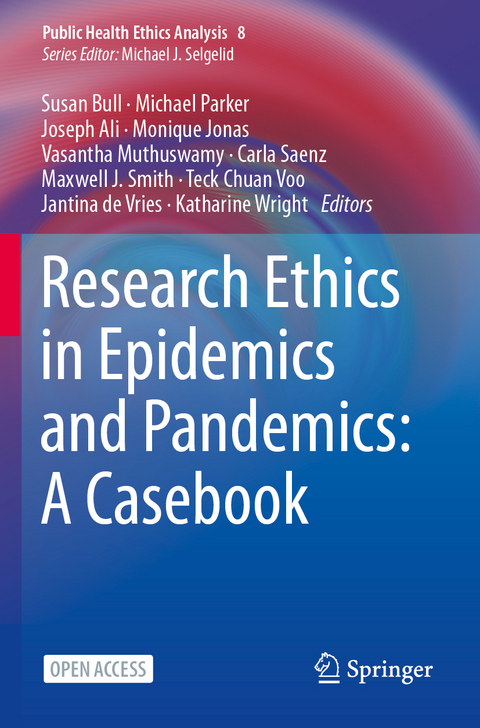
Research Ethics in Epidemics and Pandemics: A Casebook
Springer International Publishing (Verlag)
978-3-031-41806-8 (ISBN)
This open access casebook addresses complex and important ethical challenges arising when health-related research in conducted in the context of epidemics and pandemics. This book provides contextually-rich real-world case studies illustrating research ethics issues encountered by researchers, ethics reviewers and regulators around the globe during the COVID-19 pandemic. The accompanying commentaries outline relevant conceptual approaches and ethical considerations. These promote understanding and reflection on relevant ethical issues, ethical approaches and competing considerations in a manner supporting thoughtful evaluation of their implications for practice. As such the casebook is relevant to academic and professional audiences with an interest in global health, research ethics, and outbreaks and epidemics.
Susan Bull BSc, LLB, MA, PhD is an Associate Professor in Bioethics at the Ethox Centre, University of Oxford, United Kingdom and an Associate Professor of Medical Ethics, Faculty of Medical and Health Sciences, University of Auckland New Zealand. Her research interests centre on ethical dimensions of health and global health with a thematic focus on the exercise of epistemic power. Her conceptual and empirical research has addressed global health data sharing, consent to research, ethical review of research, controlled human infection (challenge) studies, and infectious disease outbreaks, epidemics and pandemics. Susan leads Epidemic Ethics, a global community of bioethicists and stakeholders involved in public health and research responses to public health emergencies. Susan has served in multiple advisory roles including as a member of the WHO Working Group for Guidance on Human Challenge Studies in COVID-19 and lead writer of WHO Guidance on the Ethical Conduct of Controlled Human Infection Studies. Susan has chaired and served on research ethics committees in the UK and New Zealand, and provided training to research ethics committees in Europe, Asia, Africa and New Zealand. In collaboration with colleagues at the University of Oxford, The Global Health Network, World Health Organization, Nuffield Council on Bioethics, and Multi-Regional Clinical Trials Center at Brigham and Women's Hospital and Harvard, Susan developed a suite of free online research ethics training courses taken by over 450,000 learners.
Michael Parker is Professor of Bioethics and Director of the Ethox Centre at the University of Oxford. Ethox is a multidisciplinary bioethics research centre with a major programme of research on global health bioethics. In 2012, together with colleagues in Kenya, Malawi, South Africa, Thailand and Vietnam, Michael established the Global Health Bioethics Network (GHBN). Since that time, GHBN has expanded to include colleagues in a number of other countries including: Brazil, Cambodia, Ghana, Laos, Malaysia, Myanmar, and Nepal. Michael has a strong research interest in infectious diseases ethics. In 2019, together with Jeff Kahn at the Berman Institute of Bioethics, he established the Oxford-Johns Hopkins Global Infectious Diseases Collaborative (GLIDE) which conducts collaborative research on infectious disease ethics together with partners in a range of low and middle-income countries. In addition to, and complementary to, these research interests Michael has also been involved a range of policy related activities in the arena of global health. From 2018 until 2020 he chaired a Nuffield Council of Bioethics international working group on the ethics of research in global health emergencies. From 2020 - 2022, he was a participant in the UK Government's Scientific Advisory Group for Emergencies (SAGE) which advised on COVID-19. And since, 2020, he has been a member of the WHO COVID-19 Ethics & Governance Working Group.
Chapter 1: Introduction: Research Ethics and Health Policy in Epidemics and Pandemics.- Chapter 2: Setting Research Priorities.- Chapter 3: Research Quality and Dissemination.- Chapter 4: Boundaries Between Research, Surveillance and Monitored Emergency Use.- Chapter 5: Adapting and adaptive research. Chapter 6: Ethics Review Challenges.- Chapter 7: Ethical Issues Associated with Managing and Sharing Individual-Level Health Data During a Public Health Emergency.- Chapter 8: Dimensions of Vulnerability.- Chapter 9: Participant Recruitment, Consent and Post-Trial Access to Interventions.- Chapter 10: Afterword.
| Erscheinungsdatum | 25.05.2024 |
|---|---|
| Reihe/Serie | Public Health Ethics Analysis |
| Zusatzinfo | LIII, 204 p. 2 illus., 1 illus. in color. |
| Verlagsort | Cham |
| Sprache | englisch |
| Maße | 155 x 235 mm |
| Themenwelt | Geisteswissenschaften ► Philosophie ► Allgemeines / Lexika |
| Studium ► Querschnittsbereiche ► Epidemiologie / Med. Biometrie | |
| Studium ► Querschnittsbereiche ► Prävention / Gesundheitsförderung | |
| Naturwissenschaften ► Biologie | |
| Schlagworte | case studie pandemic • Covid-19 • epidemic health research • Global Health • open access • pandemic health research • preparedness in times of crises • research ethics |
| ISBN-10 | 3-031-41806-9 / 3031418069 |
| ISBN-13 | 978-3-031-41806-8 / 9783031418068 |
| Zustand | Neuware |
| Haben Sie eine Frage zum Produkt? |
aus dem Bereich


